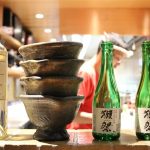What does “kishoi(きしょい)means?

“Kishoi” is often used by young people, but it was originally used in daily conversations in the Kansai region.
A ...
What does ”hetare” mean? へたれ?ヘタレ?

If you like and watch Japanese TV shows, animes, movies, comics, or use SNSs or the like, you may have heard the word ...
What does sugoi mean in english? すごい?凄い?

“Sugoi(すごい:凄い)” is a word that is often used at any time, in any situation, regardless of age or gender.
You ca ...
What does (moshi) yokattara mean? もしよかったら?

“Yokatta(よかった)” means “that was good,” but if the word becomes “yokattaRA(よかったら)”, it becomes a different meaning.
What does “Oikutsu” mean? おいくつ

Has anyone asked you a question?
“Oikutsu desu ka?”
If you don’t like it, answer it.
What does otsukaresama desu/deshita mean English? おつかれ?お疲れ?

“Otsukaresama”
“Ostukaresama desu”
“Otsukaresama desita”
Japanese people say the phrases above in many ...
What does “itadakimasu” mean? いただきます 頂きます

“Itadakimasu (いただきます:頂きます)”
This is a Japanese greeting before a meal.
For example, it is like a prayer tha ...
What does ikumen(イクメン) mean?

In 2010, the word “ikumen” spread to Japan after the “ikumen project” advocated by the then Minister of Labor.
Th ...
What does “dondake (どんだけ)” mean?

What is the Japanese the word “dondake (どんだけ)” ?
Don’t you think it’s a funny-sounding word?
It ...
What does the word abo-n(あぼーん) mean?

When browsing Japanese Internet bulletin boards or SNSs, we often encounter the words “abo-n(あぼーん)” or “abon(あぼん)”.